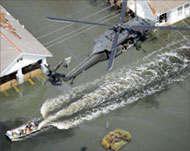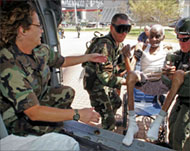New Orleans mulls evacuation order
The prospect of Hurricane Katrina survivors being dragged from their homes looms larger while lawmakers in Washington are locking horns over probing the federal response to the disaster.

With officials on Thursday saying anywhere between 10,000 to 15,000 people remained in New Orleans, police and soldiers faced some difficult choices in enforcing a mandatory order to empty the city.
Mayor Ray Nagin authorised the use of force on Tuesday but, with a number of residents still awaiting voluntary evacuation, rescue teams have so far postponed physical confrontations with those determined to stay.
Eventually, however, only the diehards will be left.
“Once all the volunteer evacuations have taken place, then we’ll concentrate our efforts and our forces to mandatorily evacuate individuals,” New Orleans police chief Eddie Compass said, promising that his officers would use “the minimal amount of force necessary.”
House-to-house search
Federal troops have joined in the house-to-house search for survivors, but senior military officers made it clear they would stand back if it came to manhandling people out of their homes.
“When this turns into a law enforcement issue, which we perceive forced evacuation is, regular troops would not be used,” said Major-General Joseph Inge, deputy commander of the US Northern Command.
 |
|
Stagnant waters around homes |
As of Wednesday, there were 18,000 active-duty soldiers and 45,000 National Guard troops in the area of the US Gulf coast devastated by Hurricane Katrina on 29 August.
The decision to authorise forced evictions was clearly taken reluctantly, with officials anxious to avoid traumatic scenes involving people who have already suffered extreme deprivations since Katrina hit.
In giving the order, Nagin cited the growing threat of disease posed by the putrid waters surrounding the wooden homes of many of the holdouts.
Health authorities said five people evacuated from the Katrina disaster zone had died as a result of contact with contaminated water.
Bacterial infection
The five had been killed by vibrio vulnificus, “a bacteria that can enter somebody through a cut, a scratch or a wound”, said Tom Skinner, a spokesman for the government Centers for Disease Control and Prevention (CDC).
|
“Once all the volunteer evacuations have taken place, then we’ll concentrate our efforts and our forces to mandatorily evacuate individuals” Eddie Compass, |
Other medical officials said the deaths should not be seen as presaging an epidemic, as the bacteria preys mostly on the very old or those already suffering from a chronic illness.
The floodwaters in low-lying New Orleans have receded as US Army engineers have brought more of the city’s damaged pumps back in operation.
The drainage process is expected to take close to three months and Nagin warned the country to brace for some “awful” revelations as the dropping water levels reveal more of Katrina’s human cost.
Body bags brought
The mayor said as many as 10,000 people may have died in the city and a Louisiana health official revealed on Wednesday that some 25,000 body bags had been brought into the area.
The city’s official death toll currently stands at 83, but that number is certain to rise over the coming week.
 |
|
President Bush signed an initial |
In Washington, President George W. Bush asked lawmakers for a further $51.8 billion in emergency funding to cover costs tied to the hurricane relief and recovery effort.
Bush, who has come under fire for the federal response to one of the worst natural disasters in US history, had signed an initial emergency package totalling some $10.5 billion last week.
“We are sparing no effort to help those who have been affected by Katrina and are in need of help,” White House spokesman Scott McClellan said.
Congressional leaders, meanwhile, battled over the question of who should handle the inquiry into how the Katrina crisis was managed.
Probe politics
Democrats are demanding an independent probe like the one, at first resisted by Bush, that looked into the 11 September 2001 attacks.
They have also started a petition to sack the much-criticised head of the Federal Emergency Management Agency, Michael Brown.
 |
|
Mayor Ray Nagin ordered forced |
Bush’s majority Republicans only agreed on Wednesday to a joint enate-House of Representatives investigation to look into the actions of “all levels of government”.
After promising to lead his own inquiry, Bush would not say whether any aides would be fired over the slow response that he has admitted was “unacceptable”.
A USA Today survey released Wednesday said 42% of Americans felt Bush had done his job handling Katrina “badly” or “very badly”. Some 35% backed the president’s effort.